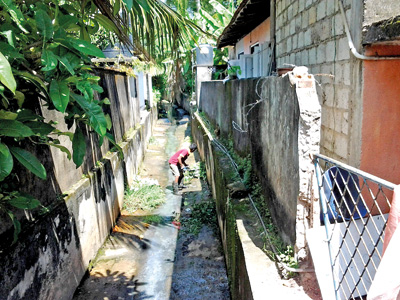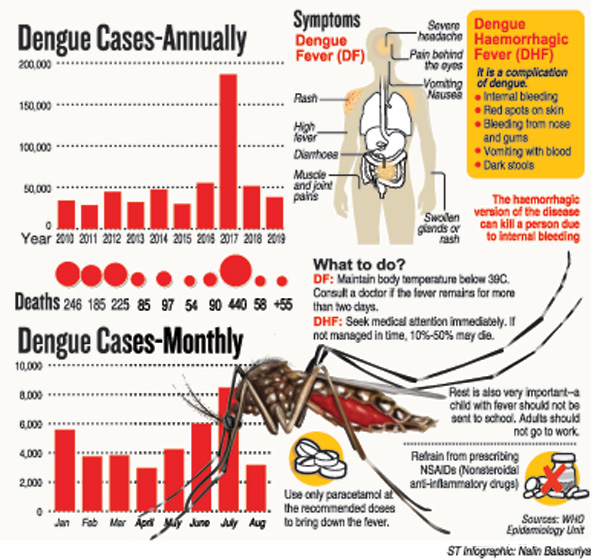News
Come to hospital soon if you have dengue symptoms, urge experts
The tiny dengue mosquito is spreading death and disease across the country.

It's important to keep surroundings scrupulously free of mosquito-breeding sites
There have been 55 confirmed dengue deaths and 38,000 people affected by this viral disease so far this year, leading to the hospitals being flooded by patients, the Sunday Times learns.
Amidst the gloom, the Director of the National Dengue Control Unit, Dr. Aruna Jayasekara gives a glimmer of hope when he tells the Sunday Times that there seems to be a “descending” trend now.
However, he cautions that we should not be lackadaisical but keep our surroundings scrupulously free of mosquito-breeding sites and if anyone gets high fever, seek medical advice immediately.
Dr. Jayasekara gives out strong plea to doctors and patients – Doctors should not prescribe non-steroidal anti-inflammatory drugs (NSAIDs) in an environment when there is dengue around and patients should ask their doctor what medicine is being given to them and not take NSAIDs.
“Remember some NSAIDs are large and round like paracetamol and if they have been prescribed without their packs, check with the doctor what it is,” he says.
When asked why the dengue numbers have been rising this year, Dr. Jayasekara points out that it is seasonal and this is the usual period –
June-July-August – when there is an increase due to the southwest monsoon. But this year it seems “a little higher” than other years.
Referring to the “significant” increase in the number of deaths, he attributes it to the people being assailed more by DENV 3, which is the predominant one and also getting admitted to hospital “a little late”.
There are four dengue serotypes – DENV1, DENV2, DENV3 and DENV4.
“We have had DENV1 and 4 in the last 10 years and in 2017 we had DENV2 which caused more virulent illness,” says Dr. Jayasekara, pointing out that some patients are also seeking treatment a little late. “Come to hospital soon if you have symptoms of dengue.”
With regard to clean-up campaigns, he says that the Easter Sunday bombing impeded the use of the security forces as they were needed for urgent security precautions. However, three days every two weeks, the Public Health Officials along with the Dengue Control Unit staff and volunteers are carrying out fogging etc in high-risk areas across the country.
Conceding that there are a few pockets where there are some problems, he requested the public to check out their half-built homes with concrete slabs for collections of water which the dengue mosquito will quickly turn into its breeding spot.
When contacted, Consultant Paediatrician Dr. LakKumar Fernando of the Centre for Clinical Management of Dengue Fever and Dengue Haemorrhagic Fever in Negombo, attributed the rise in people affected by dengue to “multiple factors”.
While conceding that there seems to be a rising trend of dengue worldwide, he explains that even though Sri Lanka was very vigilant and waged war on the dengue mosquito and its breeding sites through massive clean-up campaigns in 2017, that fervour cannot be seen this year.
Giving a chilling prediction, Dr. Fernando says that dengue deaths may jump the 100 mark by the end of the year.
“We don’t know the exact cause for the exponential rise in both patients as well as deaths due to dengue. However, the intermittent rains and the very hot weather before and after the rains seem to be conducive for the mosquito breeding to quicken,” he says, explaining that usually it takes about 7 to 10 days from the time the eggs are laid to the time the mosquitoes emerge from them. This incubation period seems shorter now, happening within 3 or 4 days. “So the mosquito production line seems to be happening faster, sending droves of them into the environment around us.”
Another factor, of course, is the waning of immunity among the population, according to Dr. Fernando.
Even though all four dengue serotypes seem to be lurking around, the predominant one is Serotype 3, for which we have no immunity, while we have some protection against the others, he says. The Sunday Times of April 21 warned the people about the dangers posed by DENV3 in an article headlined, ‘Brace for an onslaught of dengue virus 3 for which Sri Lanka has no immunity’.
Referring to the large number of deaths this year, even though the clinical management of dengue in Sri Lanka has been hailed as being very good, Dr. Fernando’s explanation is that we need to consider the “virulence factor”.
Urging doctors not to prescribe NSAIDs even for other ailments as dengue is a major factor that needs to be taken into consideration, he says that some of the deaths may be due to the action of NSAIDs which aggravate the dengue condition.
He says that some of the patients who tragically succumbed to dengue did not go into shock as is usual in severe illness but died due to the virulence of the virus which affected their liver or kidneys.
The dengue wards are overflowing and we are finding it very challenging to cope with the numbers. There is a dearth of staff, both doctors and nurses, and those who are working are over-stretched. This is why we need a permanent system, like we tried out in 2017, where we transferred staff from other less-busy wards during such an epidemic, Dr. Fernando adds.
| Behavioural change a must – campaigns in education and through media vital | |
| The urgent need is a behavioural change among the people if we are to vanquish the dangers of dengue, reiterated Consultant Physician Dr. Ananda Wijewickrama of the National Institute of Infectious Diseases, Angoda. One of the main reasons for the spread of dengue is improper garbage disposal, he pointed out, urging that there is a need to change the habits of the people in this connection. He was adamant that the best ways to bring about a behavioural change were strong campaigns both in education and the media. The campaigns should also not be one-off but consistent and throughout the year. Schools should educate children on proper garbage disposal which would then impact not only on dengue but many other diseases as well and keeping the environment clean, while the media (print and electronic) should do the same for the wider public. Referring to the high dengue deaths this year, Dr. Wijewickrama said that many people were coming late to hospital. He cited the tragic deaths of two girls in one family – one was dead on admission and the other died a day later. “Seek treatment immediately and don’t neglect your illness.” Another very pertinent point raised by Dr. Wijewickrama was that some doctors were prescribing dexamethasone and prednisolone. Sometimes these drugs are needed, but if you get fever, they need to be stopped immediately. This is why you need to ask your doctor what he/she is prescribing for you. “These are wonder drugs for certain illnesses but also take away or mask the sign and symptoms of dengue. Then you think you are fine but dengue is running high in you and can lead to severe illness,” he added. |

